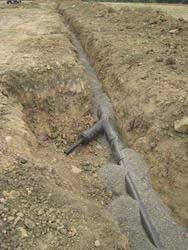Feb 12 2008
AquaBlok, Ltd., manufacturers of innovative composite particle materials, announce the approval of a product formulation that has been used successfully for the repair and sealing of certified landfill caps in various applications.
 AquaBlok Bentonite coated aggregate material
AquaBlok Bentonite coated aggregate material
Re-establishment of the low permeability soil barrier is required when a certified landfill cap is breached, whether as a result of disturbance by a pipe trench, vertical gas pipe borehole installation configuration or joining FMLs to sheet pile walls or other unique areas of landfill. The current standard process to replace disturbed soil barriers in tight areas is very time consuming and cumbersome.
A photo of AquaBlok applied in such a horizontal pipe section is shown. AquaBlok material can simply be poured into the trench or annular opening in a manner similar to gravel or other bulk backfill material.
"AquaBlok Sealant Materials Self Compact for Low Permeability and Conform to Complex Shapes such as Pipe Bedding, Methane Gas Wells and Sheet Pile Walls - without the Use of Geotextiles or Liner Materials"
Current construction practices to re-establish low-permeability conditions, which are dictated by existing and relevant regulations, commonly involve the following general procedure: digging trenches of various depths or drilling a boring (up to three feet in diameter) through each of the surficial protective layer, the low-permeability cap (including the FML component, if present) and finally down into the landfill material. In the case of a vertical pipe section with a 6-12-inch diameter perforated well casing in the boring, screened at the appropriate interval, the annular space would be backfilled above the screened interval with low permeability soils in a "step-cut" fashion to provide good bonding which results in a much larger repair area than the actual perforation.
The use of an AquaBlok sealant material for landfill trenching, gas-well construction or other general purposes eliminates the need to use compacted clay material or step cut a trench or borehole to accommodate appropriate compaction. A similar approach is used where AquaBlok is applied as a pipe bedding and sealant for installation of horizontal pipe, where the landfill soil cap component has been breached.
Use of AquaBlok for cap penetrations and as a pipe sealant has a number of technical, economic, and regulatory based advantages over current construction methods, including:
- Formulations of the product are comprised of sodium bentonite clay, and the low-permeability (10-9 cm/s) and resiliency, or re-sealing ability, of such material is well known to the environmental and regulatory community.
- The product self-compacts when wetted and hydrated. Consequently, the material can be placed as a single dry lift, with water added afterwards. The material's self-compacting ability precludes the need for additional excavation and therefore use of clay and protective material, as well as compaction-driven backfilling. In the case of a gas well, it can be constructed exclusively within the confines of the existing borehole.
- In its dry form, the product handles easily, like aggregate. Thus, it can be delivered to a site in packages varying from 50-lb sacks to two-ton super sacks and either poured or shoveled by hand.
- The amount of water needed to initially hydrate the product, once placed into the annular space, is not critical, thus precluding the need for neutron probe testing during well construction.
The product's demonstrated abilities to act as a low-permeability, air-tight seal greatly increases the potential for successful re-certification of the landfill cap upon re-inspection.